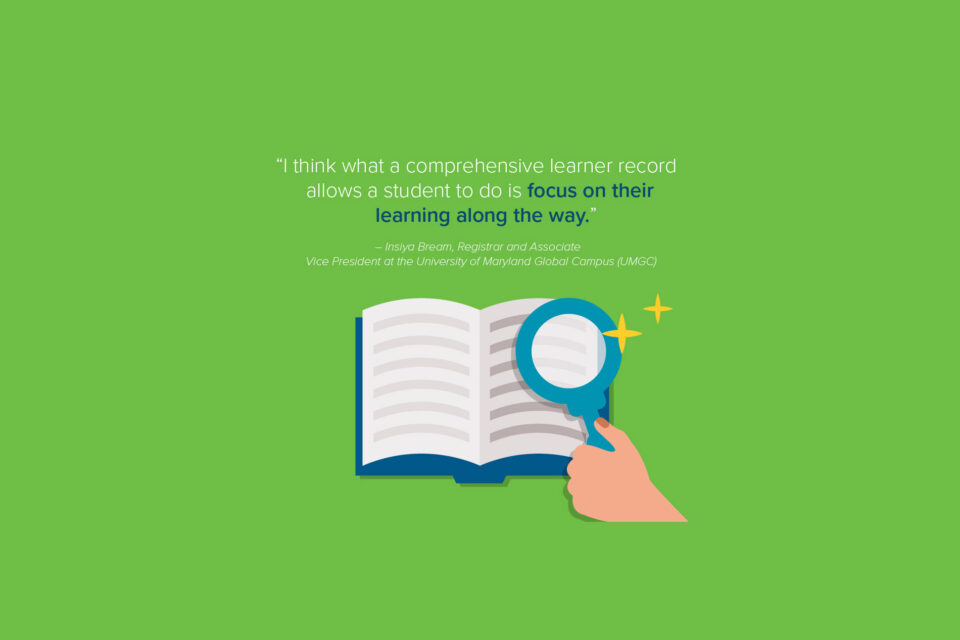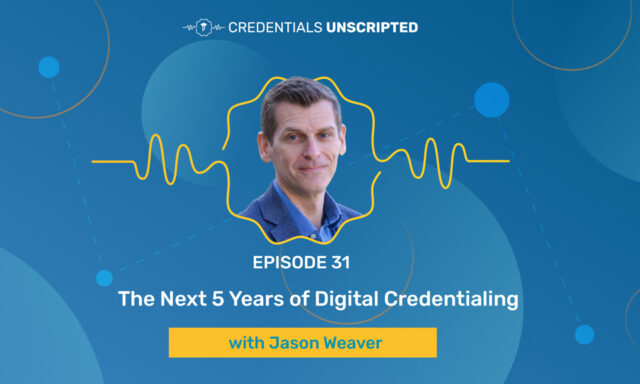As students make their way along their college journey, what kind of skills and knowledge do they pick up along the way? How does your institution make sure those students can properly showcase what they’ve learned to prospective employers?
In a recent episode of The Key podcast with Inside Higher Ed co-founder and editor (and podcast host), Doug Lederman discussed his views about traditional academic transcripts and how the comprehensive learner record (CLR) is transforming the way students translate their hard work and earned credentials as they enter the working world. He was joined by Insiya Bream, Registrar and Associate Vice President at the University of Maryland Global Campus (UMGC), and Matthew Pittinsky, CEO of Parchment, who shared their thoughts and experiences with the CLR.
The value of a dynamic transcript
Recently, UMGC developed a CLR so that their students had a streamlined, sensible way to share their credentials and clearly articulate their skills based on what they learned, what they want to learn, and how they’re going to utilize their education to set new goals and take the next step in their career journey. The school started by introducing the CLR to students in the Master’s of Business Administration programs, as the coursework fit perfectly into the flow of what the CLR had to offer.
In describing the CLR at UMGC, Pittinsky shared that it’s designed to depict each student’s experiences in a way that they can easily understand and transfer to the right person down their career path:
“When you look at a University of Maryland Global Campus comprehensive learner record, two things will stand out. One is it’s very visual, so it’s much easier to make sense of, and two is it goes deeper than a traditional transcript. As described, it presents the competency information and learning outcomes that that student has achieved. That’s what a transcript is supposed to be about, that’s what a credential is supposed to be about. It’s supposed to summarize what we know and how well we know it, not as deeply as an e-portfolio, where you’re getting into all the different evidence and artifacts, but certainly more than just courses and credits.”
How the CLR can truly help students beyond graduation
In some instances, it’s easy to earn an entry-level job out of college based on the fact that students walk away with the popular credential: a degree. But what about the professionals who have been out of college for years and are ready to earn a promotion or discover a potential new career path?
Matthew Pittinsky believes it’s time for a better, more effective way to accurately represent learning outcomes. “So this idea of a comprehensive learner record is that we should innovate the transcript… give them a record that is much more responsive to what employers are interested in – which isn’t simply courses and credits.”
The CLR can assist down these specific pathways, as Bream explained:
“I think what a comprehensive learner record allows a student to do is focus on their learning along the way. So let’s say that they’re out for a promotion at work, and those skills that they were looking to gain were accomplished within the first 60 percent of their program. That enables them to move forward with their career goals quicker than when they actually earned that final degree. I think that’s really a powerful component of being able to show them their learning along the way, not just when they’ve earned that final credential.”
Putting CLRs into practice
The decision to implement CLRs was easy for UMGC once they saw the true value for students and employers. In a recent report completed by AAC&U (American Association of Colleges & Universities), the majority of employers reported college education should provide both breadth and depth of learning while preparing future employees for workforce success, beyond the necessary technical knowledge obtained.
UMGC clearly saw the value of the CLR and its ability to clearly articulate applied learning into real-world settings. “Our entire goal of this project was to provide them with an additional record that they can actually do a couple of things with – first, share the credentials that they earned at UMGC easily with whoever they need to share it with and secondly, and more importantly, to be able to articulate their skills in terms of what they’re learning and to be able to communicate that to others, so that they can easily reach their goals and their next steps.”
To listen to the podcast episode in its entirety, click here.
Learn more about Parchment’s CLR Services here – we can’t wait to innovate with you!



